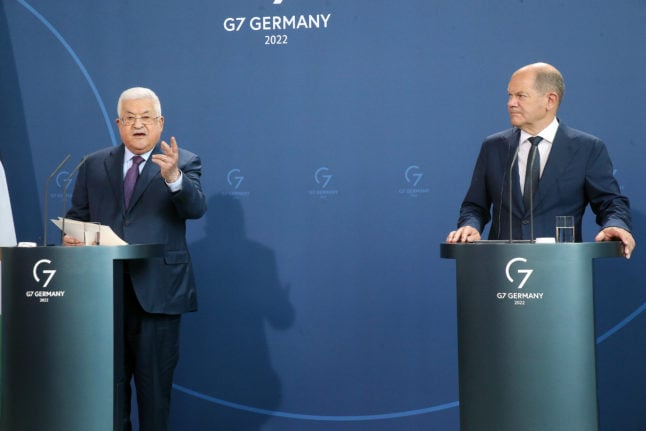At a joint press conference with Scholz on Tuesday, Abbas, 87, was asked if he would apologise on behalf of the Palestinian gunmen who carried out the Munich Olympics hostage-taking in 1972 that ended with 11 Israeli athletes and coaches killed.
Abbas did not give a direct reply but instead compared it to the situation in the Palestinian territories, and accused Israel of committing “50 massacres, 50 Holocausts” against Palestinians since 1947.
“I am disgusted by the outrageous remarks made by Palestinian President Mahmud #Abbas,” Scholz wrote on Twitter.
“For us Germans in particular, any relativisation of the singularity of the Holocaust is intolerable and unacceptable. I condemn any attempt to deny the crimes of the Holocaust.”
Scholz himself also drew fire for failing to immediately condemn Abbas’ remarks at the press conference, which ended following the Palestinian leader’s statements.
“One would have liked (Scholz’s) clarification to be more immediate,” wrote Spiegel magazine.
READ ALSO: German art show slammed over anti-Semitic images
Christoph Heubner, executive vice president of the International Auschwitz Committee said he found it “astonishing and disconcerting that the German side was not prepared for Abbas’ provocations, and that his statements on the Holocaust were left unchallenged at the press conference.”
In comparison, Scholz had directly contradicted Abbas when he used the word “apartheid” while describing the treatment of Palestinians by Israel.
The German leader replied directly that he wanted to “say clearly that he won’t use the word apartheid” and that he did “not think that is correct to use the term to describe the situation”.
In Jerusalem, Abbas’ remarks drew a hail of condemnation.
‘Monstrous lie’
“Mahmud Abbas accusing Israel of having committed ’50 Holocausts’ while standing on German soil is not only a moral disgrace, but a monstrous lie,” wrote Lapid on Twitter.
“Six million Jews were murdered in the Holocaust, including one and a half million Jewish children. History will never forgive him.”
Defence Minister Benny Gantz called the Palestinian leader’s remarks as “an attempt to distort and rewrite history”.
Yad Vashem chairman Dani Dayan described Abbas’ words as “appalling”.
He added that the German government “must respond appropriately to this inexcusable behaviour done inside the Federal Chancellery”.
Charlotte Knobloch, a Holocaust survivor and leader of the Jewish community of Munich and its region, said Abbas’ statements must be met with more than a verbal rebuff from Scholz.
“German politicians must know who their partners in the Palestinian Authority are and act accordingly. The clear words of the German chancellor afterwards should not be the only consequence.”



 Please whitelist us to continue reading.
Please whitelist us to continue reading.
Far too little, far too late from Olaf Scholz….yet once more….